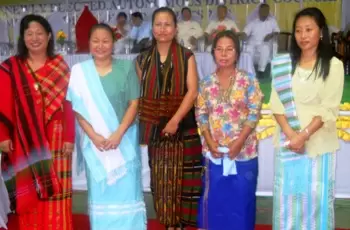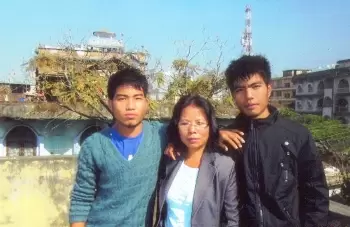Women leaders of Manipuri hills stand tall

17-May-2013
Vol 4 | Issue 20
Hatlhing Doungel, 45, is a single mother of three boys and one girl. Like any mother, she takes care of her home and kids with love and diligence, but today she is not responsible for their well being alone.
Ever since she was elected to the Autonomous District Council (ADC) of Tamenglong district she has taken her duty of ensuring the development of her region and her people very seriously.
 |
|
Hatlhing Doungel (second from right) with other women Autonomous District Council members (Photos: WFS)
|
Though she lives and works from her office in Manipur's state capital, Imphal, Hatlhing visits her Phaituol constituency once every week, never mind the security threats or the long hours away from her children.
In the violence-affected northeastern state of Manipur, while the panchayats perform the function of local governance in the Valley area, the ADCs look after the local administration in the five hill districts. Presently, there are six ADCs operational – one each in Ukrhul, Tamenglongun, Churachandpur, Chandel and two in Senapati district in Senapati and Sadar Hills.
The ADCs have a long and turbulent history. The Manipur (Hill Areas) District Council Act 1971, under which the ADCs were constituted, was passed when Manipur attained statehood in 1971. The first district council elections were held in 1973.
From the beginning, the functioning of the district councils was plagued by a number of problems, including the non-delegation of a number of enumerated powers and functions as well as the absence of financial autonomy.
Therefore, despite the clear objective behind establishing ADCs - to uphold and protect the interests of the local tribal people - they were merely relegated to implementing state schemes. From 1988 onwards, the councils began to be suspended and were fully dissolved by 1990.
The disappointing experience of the people led to widespread demands for improving the Act. Three amendments followed, with the Manipur (Hill Areas) District Council (Third Amendment) Act, 2008, being the most recent and exhaustive one.
It was in 2010 that the ADCs were reconstituted after a gap of 20 years, which was when Hatlhing was elected. In fact, three elected and two nominated women made their way into the ADCs of Ukrhul, Tamenglong, Churachandpur at the time.
Hatlhing lost her husband in 1996. Undeterred, she became active within her community as a social worker. Her years of dedicated work as the secretary of the women's wing of the Kuki Innpi Manipur, the apex body of the Kuki community, helped her win the confidence of the people. So when elections for the ADC were announced, she was encouraged to contest.
Hatlhing defeated three candidates to secure her position on the Tamenglong ADC. Today, she is happy that she is in a position to contribute to her community in a new capacity.
"Undertaking development work and the implementing welfare schemes is number one on my agenda. And to ensure smooth functioning, I work along with the tribal chiefs, who are the appointed chairmen or heads of village councils," she says.
In the last couple of years, Hatlhing has dealt with a number of crises. She recalls the stand off between the state officials and the villagers in None, owing to land acquisition during the construction of the Jiri-Toubal railway line. "When the villagers came to me with their problem I called for a face-to-face meeting with the officials to ensure that everyone got adequate compensation," she narrates.
It's the larger administrative problems she has to face that frustrate her. "Even after the ADCs have been revived, the Tamenglong council is not fully functional yet. Moreover, our budget is still allocated by the state government, which ties our hands," says Hatlhing, who is provided with a special security cover during her weekly trips to Phaituol, the only non Naga constituency in the district.
Grace Zamnu, 41, the lone woman on the 26-member Churachandpur ADC, is also passionate about her work. She was elected from Muallum constituency on a Congress Party ticket.
Unlike Hatlhing, for Grace contesting an election was not unfamiliar territory. In fact, due to her father's political ambitions her family has gone through some tough times. "A succession of failed campaigns compelled us to sell off our property and other assets to survive," recalls Grace.
 |
|
Grace Zamnu regularly visits her constituency Muallum despite the tough terrain and security threats
|
Despite that she could neither keep herself away from activism, nor could she say no to joining politics, as it provided her with the perfect platform to raise her voice for women's rights. Interestingly, it is her father, currently the Village Chief of Zou Veng and Advisor to Zou tribe's apex body, United Zou Organisation, who has been her greatest supporter.
Grace started out as a student leader and then went on to become the General Secretary of the Zomi Mother's Association, a federation of women's groups of the Zomi community.
"Women and children's rights are closest to my heart, so be it leading demonstrations against rapes and domestic violence or setting up shelter homes or rehabilitating orphans, I'm always ready," she says. It was her spirited activism that caught the eye of her community elders and tribal leaders, who suggested her name for the Churachandpur ADC.
Hatlhing and Grace are leading by example. It remains to be seen how far they succeed in ensuring women's issues take centrestage in local politics. - Women's Feature Service














